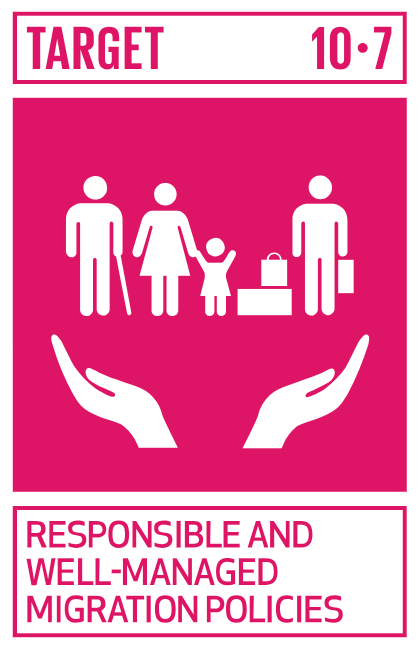-
Who We Are
WHO WE AREThe International Organization for Migration (IOM) is part of the United Nations System as the leading inter-governmental organization promoting humane and orderly migration for the benefit of all. IOM has had a presence in Romania since 1998.
About
About
IOM Global
IOM Global
-
Our Work
Our WorkAs the leading inter-governmental organization promoting humane and orderly migration, IOM plays a key role to support the achievement of the 2030 Agenda through different areas of intervention that connect both humanitarian assistance and sustainable development. Across Romania, IOM provides a comprehensive response to the humanitarian needs of migrants, returnees and host communities.
Cross-cutting (Global)
Cross-cutting (Global)
- Data and Resources
- Take Action
- 2030 Agenda
STARRT - Resettlement programme in cooperation with the Government of Romania, for refugees in Jordan, Lebanon, Türkiye, and Egypt
To date, IOM Romania has successfully implemented and completed five projects financed by the European Commission through the Asylum, Migration and Integration Fund (AMIF): STARRT I, STARRT II, STARRT III, STARRT IV, and STARRT V.
Through these activities, Syrian citizens were resettled from Türkiye, Jordan, and Lebanon, in accordance with the national resettlement quota since 2015. The projects have supported Romania's participation in the efforts of the European Union (EU) Member States to implement sustainable solutions in response to the real international protection needs of displaced persons due to the conflict in Syria in countries in the immediate vicinity.
STARRT V concluded on 31 December 2023, and represented the continuation of these transfers, in accordance with Romania's ongoing commitments. By supporting their resettlement in Romania, this project helped around 200 beneficiaries of international protection in Jordan, Lebanon, Türkiye, and Egypt find a long-term solution. The projects were carried out by the IOM Romania, in partnership with the Schottener Social Services Foundation, at the initiative of the General Inspectorate for Immigration (IGI), and funded by the European Union through the Asylum, Migration and Integration Fund (AMIF).
- Why?
-
For over 70 years, IOM has been working with beneficiaries of international protection, internally displaced people, labour migrants and other vulnerable populations. Facilitating resettlement and humanitarian admissions for vulnerable populations to begin new lives has been and continues to be a fundamental purpose and priority of the Organization as reflected in its Constitution.
As duly acknowledged in the Global Compact on Refugees, which Member States adopted in 2018, resettlement and humanitarian admission remain an essential protection tool as well as a clear demonstration of responsibility sharing and global solidarity with those countries that host the majority of internally displaced persons. Expanding access to third country solutions for beneficiaries of international protection – including through resettlement, humanitarian admission programmes and other complementary pathways – is one of the pillars of the Global Compact on Refugees.
Moreover, the organized transfer of migrants, beneficiaries of international protection and other vulnerable populations aligns with the commitments under the Sustainable Development Goals in particular SDG 10.7 focusing on reducing inequalities by ‘facilitating orderly, safe and responsible migration and mobility of people including through implementation of planned and well-managed migration policies’.
In 2021, IOM has assisted governments to resettle more than 62,000 beneficiaries of international protection globally under resettlement and humanitarian admission programmes. Romania has started building the experience in the resettlement area from 2010 and the annual quota assumed by the Government of Romania increased constantly in reaching 200 persons in need of international protection in 2020-2021. The same quota was assumed by the Government of Romania for 2022-2023.

- What is resettlement?
-
Resettlement is the procedure for the selection and transfer of refugees from a state where they have applied for protection to another state receiving them as refugees, with the possibility of permanent residence. Resettlement is a protection tool for refugees, along with integration and voluntary repatriation, and an expression of solidarity with those states that host most refugees globally.
- Who were the main actors involved and what responsibilities did they share?
-
IOM Romania and the Schottener Foundation provided the following types of assistance to selected people for resettlement:
- Medical evaluation before transfer to Romania, support for obtaining travel documents, transportation arrangements and travel preparation;
- Cultural orientation by providing relevant, accurate and current information about Romania.
- Transfer from Türkiye to Romania, Bucharest and Brasov.
- Material / medical / psychological / legal basic assistance and accommodation for 45 days from their arrival in Romania.
- Leisure / recreational / social activities.
UNHCR
- Identifies and presents to the Romanian General Inspectorate for Immigration (IGI) cases of Syrian refugees from Turkey with kinship links in Romania for examination for resettlement. In turn, other organisations or individuals may refer to IGI analysis of Syrian refugee cases in Türkiye.
- Supports refugees selected for resettlement in obtaining domestic and outward traffic permits from Turkey.
General Inspectorate for Immigration (IGI)
- Analyses cases and takes a decision to relocate under Government Decision 1596/2008 on resettlement of refugees.
- After relocation, offers reelected legal and physical protection, including access to civil, economic, social, and cultural rights similar to those enjoyed by Romanian citizens.